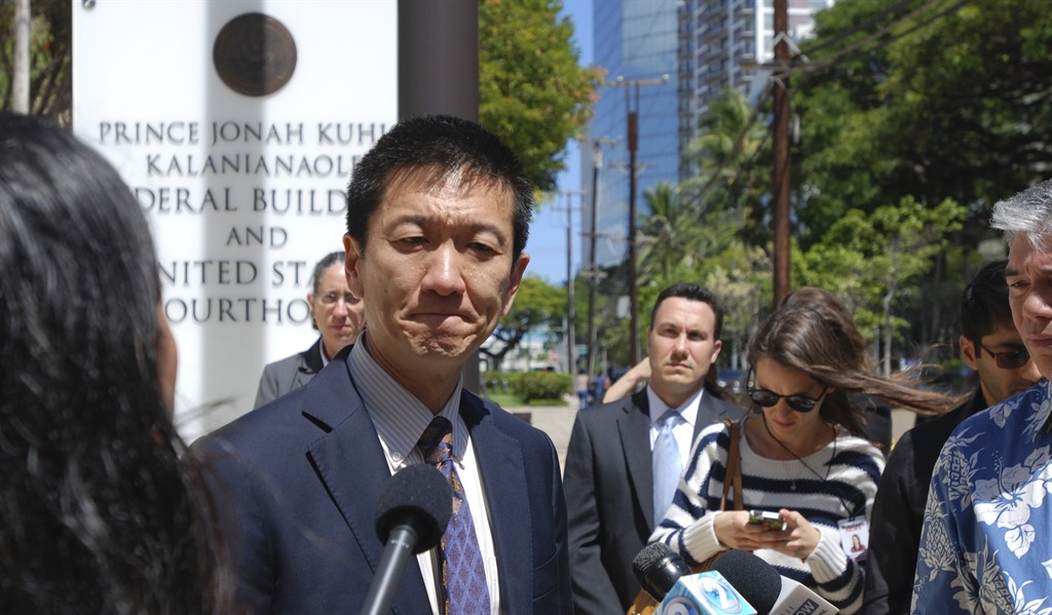Donald Trump’s executive order pausing entry to the US for nationals of six countries got another day in court today, but it doesn’t appear to have gone much differently than the fight over the previous executive order. Three judges of the Ninth Circuit heard arguments on the appeal of a temporary injunction from a district court in Hawaii that put a stop to enforcing the second EO. It didn’t take long for the panel to focus on the same problem as the first EO had:
Circuit court judge asks U.S. Solicitor General Wall if "in reality, this is a ban against members in adherence to the Muslim faith," pic.twitter.com/QpLwkG4Iga
— CBS News (@CBSNews) May 15, 2017
Wall offered a pretty good answer to the challenge, but don’t get your hopes up. If personnel is policy, the White House had better not get its hopes up:
A federal appeals court is set to hear arguments on Monday over President Donald Trump’s temporary travel ban on people entering the United States from six Muslim-majority countries, the second such court to review Trump’s directive over the past week.
A three-judge 9th U.S. Circuit Court of Appeals panel, made up entirely of judges appointed by Democratic former President Bill Clinton, will review a Hawaii judge’s ruling that blocked parts of the Republican president’s revised executive order on travel.
For that matter, things didn’t look much better last week at the 4th Circuit either:
Last week the 4th U.S. Circuit Court of Appeals in Virginia reviewed a Maryland judge’s ruling that blocked the 90-day entry restrictions. That court is largely made up of Democrats, and the judges’ questioning appeared to break along partisan lines. A ruling has not yet been released.
Most people expect this to end up at the Supreme Court, but these two appeals might throw a wrinkle into that destiny. If both courts end up ruling the same way, the Supreme Court might just decide to take a pass on the case. They usually feel compelled to act when conflicts of precedent arise between two or more circuits, but if the precedents align, there is less need to intervene, at least theoretically.
That seems less than likely, however. It takes four justices to grant cert at the top court, and there might be four even if both circuits rule against Trump, assuming they do so. The challenges to the travel ban involve an intriguing argument about political arguments during campaigns having the ability to color future orders and enforcement, and the Supreme Court should find that debate and its implications for political speech veeeeerrrrrryyyyy intriguing.
There’s another question to be asked, though, that goes to the credibility of the White House position. The travel “bans” demanded a 90-day pause to improve the vetting of incoming travelers to the US for national-security reasons. Even though the executive orders on denying entry have been blocked from implementation, nothing has prevented the Trump administration from proceeding to improve the vetting process for nationals from these six nations — a need which the White House insists is a vital national-security concern which validates their actions. It’s been longer than 90 days since the first of these travel bans was issued, so … where’s the new vetting process? Under the Trump administration’s rationale, the ban should have been lifted on its own by now, and the complaints mooted.
Don’t think that will escape the Supreme Court’s notice if it gets to that level, by which time the 90-day pause should have concluded for the rewritten EO, too. The White House might end up arguing that other priorities have used the resources needed for this project, but that’s not going to stand up well with the claims that the national-security risks were so high that the federal government needed an extraordinary action on enforcement. The EOs themselves framed it as a 90-day issue, and the White House has had all the opportunities it needs to staff up appropriately for their own self-declared mission.
They may still rule that the enforcement mechanisms fall completely within the executive branch — as they should — but they’ll certainly wonder whether this is as temporary as the White House claims it is, or whether the 90-day claim is just a way to get a blank check to work around Congress for a permanent policy on visas. This should be moot by now, and the fact that it isn’t may make for a lot of uncomfortable questions from appellate courts now and in the future.








Join the conversation as a VIP Member